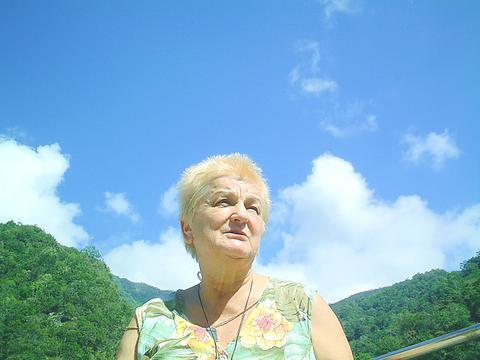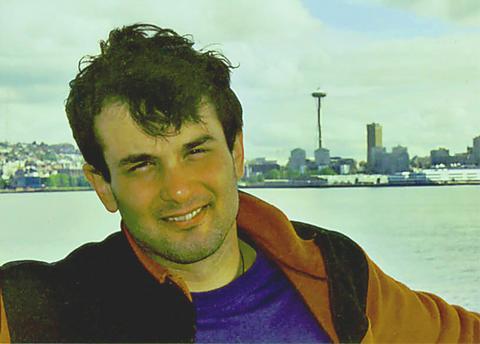Most days are the same for Barbara Klita. She wakes, dresses and drapes herself in a clapboard sign bearing images of her son, Fred Frontier, and bold-face Chinese characters asking if anyone has seen him. She has breakfast at McDonalds and heads out to meetings with someone who has offered her some type of assistance in the search for her son.
It's been a year to the day since Frontier is believed to have walked off on a day hike in Taroko National Park, Taiwan's postcard-picturesque east coast tourist destination. He'd come to teach English at a Hess language school and had been in the country just three days after arriving from his home in Seattle, Washington. An avid outdoorsman, he quickly made his way to Taroko to check out some of the sites he'd read about in his dog-eared copy of Lonely Planet's Taiwan guidebook. He packed a change of clothes and a Pentax camera in a small backpack and a few items in a red waist bag, checked out of the Catholic hostel at which he was staying and set off to explore the park. Ten days later the bags mysteriously made their way back to the hostel, but there is no indication that Frontier ever did.
A month after his disappearance, he was reported missing and two months after that authorities conducted the first physical search for him. His mother came to Taiwan to assist in the investigation and has been here for much of the past year prodding the police and government. Despite her efforts, the case has stalled.

PHOTO: DAVID MOMPHARD, TAIPEI TIMES
Klita's world is bound in a bulging plastic business card holder held together with a black rubber band. Hundreds of cards from all the people she's met in the past year have notes scribbled in the corners. It's a ragtag rolodex filled with the names of government officials, police administrators, attorneys, reporters, Buddhist monks, fortunetellers and US governors.
She's a Polish immigrant to the US whose accented English has kept her from securing part-time work teaching language at a bushiban, and so she lives off her modest savings and the kindness of strangers. The government has granted her a five-year renewable visa. She had been staying on a cot in a Taipei hostel until an attorney spotted her clapboard and offered her a spare room in his home. A devout Catholic, she says it's her faith that keeps her company in a country where she doesn't speak the language.
At lunch earlier this week, she crossed herself before a McDonalds Fillet-O-Fish and recounted the few facts she's learned over the past year and the many questions that remain unanswered.

PHOTO COURTESY OF BARBARA KLITA
"The police still know nothing," she said. "I ask them: What about Fred's bag? Who brought them back to the hostel? What about the people that were at the hostel at the same time as Fred? What do they remember?' The police say they will go ask and then they never tell me what they learn."
She has presented letters to the Presidential Office, the American Institute in Taiwan, the National Police Administration and others, asking for such simple things as an official report on the status of her son's case, and that all the information that's been collected be compiled in a single place to better coordinate the investigation. She claims the requests have not been met.
None of the law enforcement officials contacted for this report were willing to go on record, but some intimated that, in all likelihood, Frontier simply stepped off one of the many trails that cling to cliffs throughout the national park. The steep, densely foliated terrain, they say, has hindered their ability to recover his body.
"But what about his bags?" Klita asks. "If he fell off a cliff, why wasn't he carrying his bags? When did he take them off? Where? How did they get back to the hostel 10 days later? Why can't police find the white car, or who took the photo with Fred in it? "
Police developed the film from Frontier's camera that was found along with his backpack: 16 photos of marble-bedded rivers, the monastery in Tienhsiang and, most notable, a shot of him smiling and leaning against a white car. Who took the photo and whose car Frontier is leaning against remains unknown.
Klita has little faith that local law enforcement authorities will uncover any more information than they already have. In Taiwan, she says, someone can shoot the president in the middle of the day and they won't find him.
She said she would like to hire a private investigator but does not have enough money. "Private investigators don't shake hands with police, they shake hands with mafia. They can learn what happened to Fred," she said, adding that she believes her son may have been a victim of wrongdoing.
She's spoken with monks.
"One of the monks told me that Fred is still in Taroko. He's in a place where he can see others but no one can see him. That's why they don't find him," she said. "Very strange."
"Another woman last week wanted to teach me how to pray to Buddha," Klita continued. "She had me say the same sentence over and over. `Oh ma to somethingorother.' I didn't want to be impolite, but I was not interested in that. It won't help find Fred."
She's visited fortunetellers.
"Seven of them. One was in Hualien; a very old woman. I asked, `How do I pay her?' and they told me she likes the Taiwan vodka and chews ? you know ? the dope," she said eating an imaginary betel nut. Other fortunetellers have "pinpointed" Frontier's location by marking maps with circles that encompass thousands of acres.
Most recently she's called on a governor. Frank Murkowski, the governor and former senator of her adopted state, Alaska, was in Taiwan Thursday as part of the US' official delegation to President Chen Shui-bian's (
Most days, she says, are spent toting her clapboard around Taipei. In the afternoons, she goes to a room in the library that has been set aside for her use. There she types letters to local officials and sends e-mail messages to US officials she hopes might help her, and keeps in touch with friends back home. In the evenings, she returns to the spare room, prays to squelch sadness and sleeps.
"I took a vacation in January," she says finishing her fish sandwich. "For a month I went to Australia and stayed in Catholic hostels there. It was wonderful fun! Many kids from America, England, Canada I spent time with. ? They are all doing what Fred would be doing.
"But then I come back to this," she said, and gripped her clapboard sign. "If my son is alive, show me where he is. If he is dead, show me his body. I need closure."
A benefit concert for Fred Frontier is taking place at the Youth Activity Center in Tienhsiang this evening and tomorrow evening beginning at 5pm, with music from Doughlas Newton, Scott Ezell, Eddie, Leslie and anyone else who'd like to join a jam session. Transportation is available from Hualien by calling Eric Lier of the Overseas Americans in Taiwan at (0938) 428 681.

Under pressure, President William Lai (賴清德) has enacted his first cabinet reshuffle. Whether it will be enough to staunch the bleeding remains to be seen. Cabinet members in the Executive Yuan almost always end up as sacrificial lambs, especially those appointed early in a president’s term. When presidents are under pressure, the cabinet is reshuffled. This is not unique to any party or president; this is the custom. This is the case in many democracies, especially parliamentary ones. In Taiwan, constitutionally the president presides over the heads of the five branches of government, each of which is confusingly translated as “president”

By 1971, heroin and opium use among US troops fighting in Vietnam had reached epidemic proportions, with 42 percent of American servicemen saying they’d tried opioids at least once and around 20 percent claiming some level of addiction, according to the US Department of Defense. Though heroin use by US troops has been little discussed in the context of Taiwan, these and other drugs — produced in part by rogue Chinese Nationalist Party (KMT) armies then in Thailand and Myanmar — also spread to US military bases on the island, where soldiers were often stoned or high. American military policeman

An attempt to promote friendship between Japan and countries in Africa has transformed into a xenophobic row about migration after inaccurate media reports suggested the scheme would lead to a “flood of immigrants.” The controversy erupted after the Japan International Cooperation Agency, or JICA, said this month it had designated four Japanese cities as “Africa hometowns” for partner countries in Africa: Mozambique, Nigeria, Ghana and Tanzania. The program, announced at the end of an international conference on African development in Yokohama, will involve personnel exchanges and events to foster closer ties between the four regional Japanese cities — Imabari, Kisarazu, Sanjo and

The Venice Film Festival kicked off with the world premiere of Paolo Sorrentino’s La Grazia Wednesday night on the Lido. The opening ceremony of the festival also saw Francis Ford Coppola presenting filmmaker Werner Herzog with a lifetime achievement prize. The 82nd edition of the glamorous international film festival is playing host to many Hollywood stars, including George Clooney, Julia Roberts and Dwayne Johnson, and famed auteurs, from Guillermo del Toro to Kathryn Bigelow, who all have films debuting over the next 10 days. The conflict in Gaza has also already been an everpresent topic both outside the festival’s walls, where